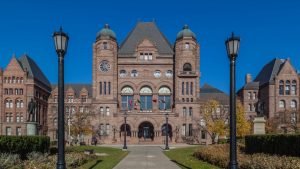Construction stakeholders are applauding a move by the Ontario government to spare the province’s employers from an unexpected hike in Workplace Safety and Insurance Board (WSIB) premiums.
The spike would have resulted from a pandemic-related quirk relating to a new WSIB Maximum Insurable Earnings Ceiling scheduled to take effect for 2021 in January.
Constructors with their higher than average wages would have been especially hurt by an unexpected increase of 7.8 per cent in the earnings ceiling, they claimed, and they have been lobbying the Ministry of Labour, Training and Skills Development for relief ever since the premium hike was announced by the WSIB Oct. 1.
The introduction of standalone legislation on Dec. 8 to deal with the problem by limiting the increase to two per cent prompted expressions of relief in the sector.
“We are relieved,” said David Frame, chair of the Construction Employers Coalition for WSIB and Health and Safety and Prevention, who has been in consultation with both the WSIB and the MOL on the matter.
“It is one of those things that was obviously not intended and it was not fair to the construction industry. It is a time where everyone is struggling. We are looking to the industry to lead us out of the recession. Something like this is just not helpful. We are very relieved that the minister recognized this and made it happen.”
Giovanni Cautillo, president of the Ontario General Contractors Association, added, “Overall, from the industry’s standpoint, we are very happy that the government has been responsive on this matter. Clearly under McNaughton’s leadership they stepped up for the contractors.”
The new ceiling announced in October was $102,800, compared to $95,400 in 2020, a rise of 7.8 per cent. Besides construction, mining and some manufacturing employers who employ skilled high-wage earners were in line to suffer.
Changes to the Maximum Insurable Earnings Ceiling are linked to average earnings in Ontario as measured by Statistics Canada. Given that the COVID-19 pandemic caused more layoffs in lower-paying sectors such as hospitality and retail in the first months of the pandemic, the snapshot taken by Statistics Canada recorded a higher than typical average wage in the province.
The WSIB had otherwise announced a premium freeze. And relief would require legislative change.
Minister of Labour Monte McNaughton indicated his ministry was aware of the problem early on and has been working to find a solution.
“We started hearing about this potential unintended rise in WSIB premiums and we wanted to move quickly to resolve this and ensure there is predictability in the industry,” he said.
“I am very proud of where it landed because it is going to support small businesses across the province, particularly small contractors, and it is going to ensure workers are going to be protected as well.”
McNaughton said in consulting on the issue, he had heard from small construction employers with six or eight employees, and in one case an employer said they would have to remortgage their house because of the potential spike in premiums.
“It was going to have a detrimental impact,” McNaughton said.
“I adore the construction industry and the construction industry is going to play a lead role in our economic recovery.”
Andrew Pariser, vice-president of the Residential Construction Council of Ontario, noted that the hollowing out of the low-wage sector was a “one in 100-year problem” and said the potential premium hike was addressed fairly by the government.
“Minister McNaughton and the whole Doug Ford government, they introduced standalone legislation which is not something you generally see with the WSIB, and they are clearly showing contractors and employers and businesses they are priorities and they believe we are going to lead the recovery,” said Pariser.
Frame noted the Ontario legislature is on a break until mid-February and that legislation could not be approved until the end of that month at the earliest. Premiums go up at the start of a calendar year, he said, meaning the timing of the legislative relief was not ideal.
McNaughton said the legislature resumes sitting Feb. 16 and he intended to see the legislation passed quickly. He promised businesses they would not suffer from extra premium costs.
“It will work out over the course of the next year that these businesses are protected,” he said.
“I can reassure all businesses that there will be a mechanism in place to protect them from substantial increases due to COVID-19.”











Recent Comments
comments for this post are closed